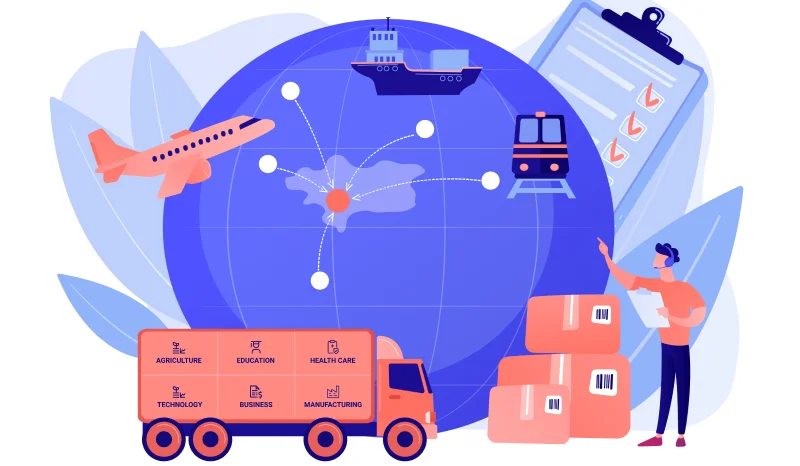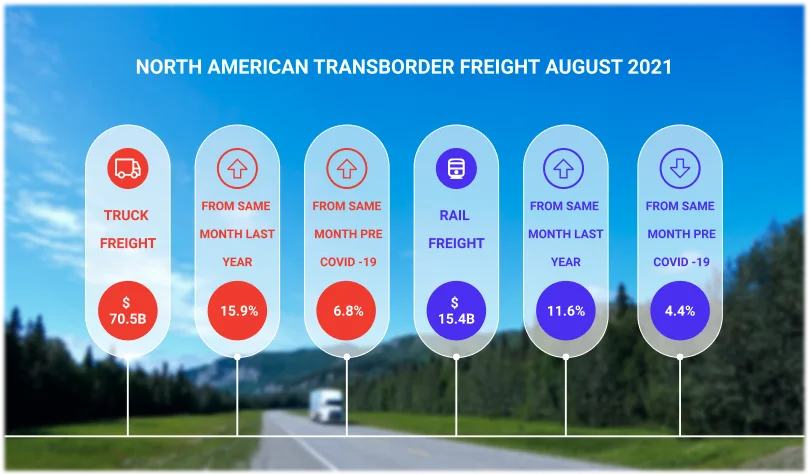Logistics is the lifeline of a business.

Whether commuting from one place to another or shipping goods, transport is an inevitable part of any business. Hence, establishing a business in the transport sector touches far more lives than any other business can.
Starting from passenger transport to large-scale freight operations, these transport businesses have gained immense exposure. Transport business in modern times extends plenty of options on the table. It is your level of interest that can get you a flourishing business setup.
Establishing your own business sounds pretty cool, but the hard work and efficiency involved are way beyond imagination. If you are a newcomer or new business owner, this article will be of great help to you. Wondering how to start a transportation business? Follow the below guide and get all your doubts cleared. Swipe up to know more!
Quick Insight:
- What is a Transporting Business all about?
- A step-by-step guide to launching a transport business
- Specific transport niche
- Create your preferred business model
- Create well-designed business plans
- Federal tax ID number
- Get your license and permits ready
- Setup your business budget
- Make your purchase wisely
- Well-established hiring procedures
- Periodic maintenance and recertifications
- Implement Technology Solutions
- Probable mistakes when starting a transport business
- FAQs
Before we move on to the details, let’s understand what are the main types of transporting business.
What is a Transporting Business all about?
The transportation business is something that caters to every sector both at business and organizational levels. It is one such business venture where you can work independently as well as, help other businesses to deliver their goods and services to the actual business point.
This is a unique business field that works on 360-degree verticals offering a wide range of exposure. The services are not bound to any particular client. It can be local, national, or even international based on how well you organize your business structure.
Before you learn how to start a transportation business, know about the basic categories you can work on.
Personal Transport:
Taxi services shared cabs, and limousines offer one-to-one services. These kinds of personal transport services cater to individual needs.
Local Transport:
This kind of transport facility serves the regional market for transporting materials, livestock, and other consumer goods.
Global Transport:
Global Transport companies function the same way, just by providing services on an international scale. These services involve sea shipping and air-based cargo deliveries.
Each category requires its own set of skills and expertise to build a well-established business platform. All it requires is your interest and how well you design your business model.
To help you prioritize your business needs and requirements, here is a well-organized guide for starting a transport business. Take a look!
A step-by-step guide to launching a transport business
Before you start on with your dream project make sure you are well aware of the eyes and ears of this transport sector. You must prioritize the significant factors that may give you challenges if neglected. Thinking about how to start a transportation business?
Here we are with a few simple steps that can help you to launch a successful transport service company. Check it out now!
Step 1. Specific transport niche
With the availability of endless opportunities in this sector, you might be a bit confused. But you must decide wisely on which niche you will specify. To achieve success you have to be intelligent enough to select the category of service that you would offer. Starting from logistic companies, and bicycle rental to medical transport there are multitudes of options. But you must research thoroughly the pros and cons of a specific service before launching it. Take a survey of your locality and figure out the supply, demand, and relevant needs so that you choose your service accordingly to get a steady client base.
Step 2. Create your preferred business model
Once you have learned about the categories available and decided on your niche, it’s time to frame your business model. While setting up the business structure you need to have a clear idea of the operational information of various formats. The types of business entities vary in structure, rules, laws, sizes, and methods of operation, We have discussed a few in this article.
a. Sole proprietorship:
In this model, either an individual or a married couple owns the business. Though you are offered ample flexibility at times you may suffer losses on a personal level.
b. General or limited liability partnership:
This model offers you the opportunity to share your liabilities with your partner. Moreover, you can even share the risk, debt, and other actions of the business with your partner.
c. Limited Liability Company (LLC):
Performing as an LLC sounds profitable as it protects you from losses and considers the company’s performance as a whole. You get various tax benefits while your personal information remains secluded from that of the company’s information.
Step 3. Create well-designed business plans
Starting a transportation business involves in-depth research. This would help you to know various factors that are required to incorporate to establish a strong foundation. Getting started in the transport industry has much to do with writing a foolproof business plan.
Not only does it help you track your budget, marketing plans, expenses, cash flow, and other stuff, but it also provides a clear business presentation to your investors. Market analysis is something that can decide your business’s future.
Study your competitors’ rates, service presentation, and delivery, and gather other information. Do remember to research the locality to predict your profitability of running the business in that area. Here are the points that you need to include in a business plan:
- A business overview
- Market analysis
- Business Budget
- Pricing strategy
- Marketing Plan
Step 4. Register your business and get the federal tax ID number
Setting up your transport business may sound profitable but involves various legal implications. To safeguard yourself as well as the business from serious legal issues you need to get your business registered and licensed under local authorities. Rules differ from region to region, hence consult the local government to know about the procedures.
Federal tax ID or Employer Identification Number (EIN) is a significant factor that helps you with your tax preparation. This number identifies and protects your business from theft, and eases up your loan application and yearly or quarterly tax filing. Besides, it also smoothens the processing of business credits.
Step 5. Get your license and permits ready
The license requirement in the transport business is specifically more than any other. There is a wide range of scenarios that you may come across which may create serious legal implications. To ensure the safety of your business you must keep your license and permits ready. Let’s give you an idea about various licenses and permits involved in a transport business:
- Commercial Driver’s License
- Fuel Carrier License
- Heavy Cargo Permits
- Commercial Vehicle Registration
- Insurance coverage of drivers, passengers, or goods
Step 6. Setup your business budget
Businesses without a proper budget estimate are surely going to fail. Draft your budget or business finance beforehand based on the type of services you are going to provide. One vehicle would cost you less than a full-fledged logistic fleet. But, if you are applying for a loan, lenders would surely ask for budget plans. So before you face such a question, prepare yourself with every detail. Draft all the benchmarks that would come your way for financial goals.
- Investments in supplies and resources
- Investments in sales and marketing
- Specify your debt amount and other expenses
- The average amount of revenue needed for balancing the operating expenses

Billbooks – Light on pocket yet high on performance.
Sign up now for a free trial!

Step 7. Make your purchase wisely
Opting for the right resources can get you an ample amount of profit from day one. Besides, it would give your new business a professional look. The quality and size of the vehicle is an important parameter that depends on various factors like:
- Whether you have opted for passenger or goods transport
- Weight of the materials in case of goods transport
- Type of ground on which the average trip will take place
- Possibility of wear and tear
- Choosing fuel-efficient or other sustainable options
Depending upon the above factors you need to make your purchase wisely.
Step 8. Well-established hiring procedures
To formalize your business process, establishing a solid hiring mechanism is very important. Besides recruiting drivers for your vehicles, you do need other professionals who would take care of other verticals.
Hiring maintenance technicians, administrative staff, accountants, sales and marketing professionals, and HR staff are the basic requirements of your business. The hiring process should be incorporated efficiently so that efficient personnel look after the respective field for better company performance.
Step 9. Periodic maintenance and recertifications
When you plan your own business it is obvious that you focus on long-term objectives. To ensure the secure functioning of your business in the long run, it is essential to go for recertifications and periodic maintenance. The transport business involves vehicles that need to be maintained with proper servicing at specific intervals. Besides, timely renewal of license and a routine check on these legal requirements are necessary.
Step 10: Implement Technology Solutions
Utilizing technology solutions can significantly enhance the efficiency and profitability of your transportation business.
Fleet Management Software: Helps track vehicles, manage maintenance, and optimize routes.
Online Invoicing: An online invoicing system simplifies billing and improves cash flow by automating and streamlining the invoicing process. With automated invoicing, businesses can generate and send invoices automatically based on completed deliveries, reducing manual work and minimizing errors. Payment integration allows customers to pay online via credit card, PayPal, or bank transfer, offering them convenience and ensuring faster payments. Additionally, tracking and reporting features enable businesses to monitor outstanding invoices and generate detailed financial reports, providing valuable insights into their financial health and helping them manage their cash flow more effectively.
Do you know?
- The total revenue of the US trucking industry is nearly $800 billion.
- Transportation is the fastest-growing sector that has been noticing a growth rate of 7% since 2011.
- As per research, the global market value of logistics has crossed $4 trillion, which is 10% of global GDP.
- Currently, the US accounts for over 42% of the global transportation sector.
- China and India are emerging in the logistic sector and are considered to have an influential impact in the global market in the coming years.
- The trucking industry is considered to have pumped the US economy with more than $30 billion through direct employment.
- Surprisingly, 90% of the market pie chart is occupied by small trucking businesses.
- The US trucking industry operates 16-million heavy trucks and over two decades they have controlled 95% of emissions.
Starting a business from scratch may lead to errors and mistakes. Do follow the below checklist to avoid some of them.
Probable mistakes when starting a transport company
Only focusing on how to start a transportation company will not help you maintain business health. Ensure the longevity and health of your business by consulting a financial advisor before making some crucial business decisions. Let’s take you through some points that you need to check before committing any serious mistake.
- In the transport business, it is quite common that you may need to operate in another jurisdiction or cross state lines. Research thoroughly the rules and regulations involving permits and licensing before you unknowingly violate any of them.
- Consider every aspect of the business. Though it may be a tedious job to take care of every detail. Get general liability insurance done to fill in all the gaps that would safeguard you from various accidental issues.
- Incorporating waivers is a must. Failing to do so may result in unnecessary misunderstanding and accidents when it’s time to get the payment or when you serve passengers.
A quick Q&A to clear all your doubts:
If you are wondering why to start a transportation business, then you would be pleased to know that this business allows you to start small. Moreover, you progress incrementally and do not require any specific certification. You can start with minimal education and training. But ensure you have enough start-up capital as all businesses demand initial investment. Besides, make sure you add up your finances before you start a full-fledged business. You are good to go as this sector provides a wide scope for development.
Yes, hiring a third-party service for your business might seem helpful if you have an excessive workload. Depending upon the type of logistics service you provide you can opt for any third-party service. Only make sure to maintain the following:
1. Hire qualified drivers.
2. Make sure the vehicles are licensed.
3. Train the drivers to drive in any situation like storms or heat waves.
Planning is very important for your business and is not always easy. Finding customers for your transportation business is one such vital aspect of your business growth. You can acquire customers by various technological means. Some of them are:
1. Social media marketing
2. SEO optimization
3. SMS notifications, etc
Whether small or big business establishments, accounting is a vital part. Even if you keep an efficient finance professional, you can always employ sophisticated software to help you with your work. Billbook is here to ease up documenting financial data, sending invoices, sending payment reminders, estimates, and other budgetary essentials.
Ease up your business finance with Billbooks – Sign up now!

Fun Facts
- Logistics and transport are an integral part of business operation and supply chain.
- Transportation is one of the world’s largest sectors consisting of six other sectors- road, rail, maritime, aviation, storage, warehouse.
- 70% of annual freight transport is delivered through trucks in the US, which is around $671 billion of manufactured and retail goods.
- The most shipped items are electronics, furniture, food, and clothing.
- In the US there are nearly 3.5 million truck drivers.
- On average the truck drivers in the US drive over 112,000 miles every year.
- If all the sausages delivered per year are joined together, it would reach beyond the moon.
- The US comprises 566 railroad lines that are over 138,000 miles.
Bottom line!
The transport business is an amazing sector where you can start with small-scale funding and go up to a global scale. How to start a transportation business is not just a dream anymore. To help you with an incredible future for your transport business, we have posted this article to guide you to establish a strong foundation. Get on with your business goals now!



